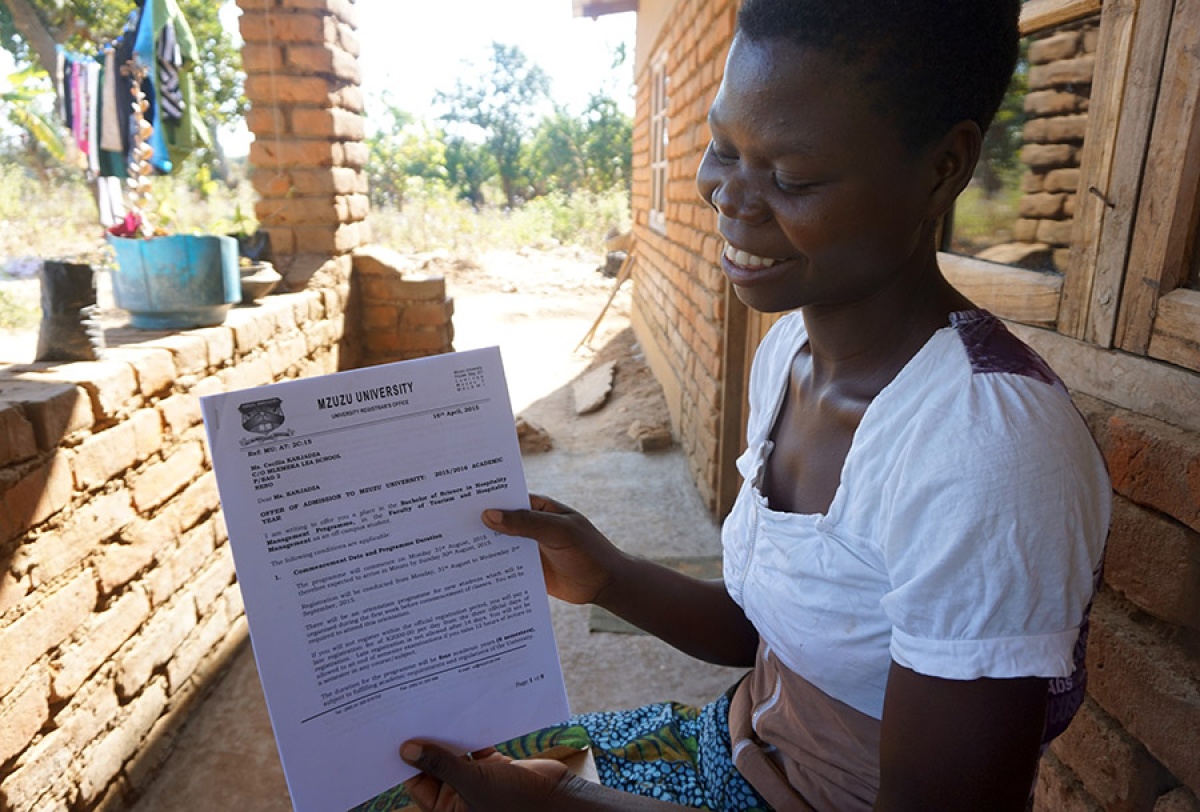Cecilia Kanjadza Reaches University from Rural Malawi
Posted on Jul 15, 2015

Cecilia Kanjadza, 19, scanned the local newspaper in Neno, Malawi, for her name while standing in Partners In Health’s office. It was a moment she wanted to share with PIH staff. Earlier that day she had received a phone call letting her know she had been accepted to college. The newspaper, containing university admissions, would confirm this.
Edwin Kambanga, a PIH officer, laughed, recalling her delight when she found her name listed under Mzuzu University’s degree program: “As soon as she saw her name in the newspaper, she screamed, clapping her hands. She said, ‘This is wonderful!’”
The chance to pursue a bachelor’s degree is truly something to celebrate for Kanjadza and PIH. She is the first girl to be accepted to university from a public high school in Neno, a remote and poor district in the south of the country with a population of 150,000. Families struggle to help their children reach high school let alone university—a pipe dream for most, and certainly for girls without private schooling. Kanjadza is exceptional, both because she worked hard despite significant challenges, and because through a PIH program she was able to pay for her schooling.
Kanjadza’s victory is preceded by many difficult years for her and her family. Her father passed away when she was four and all his possessions went to his relatives. Kanjadza and her brothers and sisters—she is the fifth of six children—were left with nothing. Her mother decided to leave the country’s second largest city, Blantyre, population 1 million, and move the family to Neno, where they live in a small village called Kambale. For six months the family survives on maize they grow in their garden. The rest of the year, her mother must try to find work on nearby farms.
To have the financial stability to look after her mother was Kanjadza’s greatest wish. Although she doubted she would go to college, she let herself dream about it. She excelled in math and science classes. Her favorite teacher, Emmanuel Soko, spotted her talent and encouraged her to continue her education.
Doing this would require resilience as well as brains. Schools don’t always have enough teaching materials; libraries and laboratories are a luxury; and for most students, studying ends when the sun sets (95 percent of the population does not have electricity, according to the 2010 Malawi Demographic Health Survey).
Facing these difficulties and financial problems, parents are forced to withdraw their children from school. In PIH’s view, this is a devastating outcome for poor families who, without education, face worsening job prospects and have little hope of improving their situation. Without the money to live safely and comfortably with adequate housing and nutrition, their health will inevitably suffer.
This is why PIH began POSER, the Program on Social and Economic Rights, which addresses social problems that impact an individual’s health. Kanjadza and her siblings receive support from POSER, which she says was the reason she was able to stay in school. POSER supported 2004 students last school term, including 948 girls. With uniforms, exercise books, and school fees paid for by PIH, Kanjadza excelled in high school.
Kambanga, who works closely with Kanjadza and other families through POSER, knows what this means for Kanjadza’s future. “What we like to see when we support students is that their lives change,” he said. "Once they go to university, they get a good job and are able to sustain themselves and their families."
It’s a shared victory for PIH and Kanjadza. After that initial phone call about her university admission and a dance of joy in her house, Kanjadza was quick to come to PIH’s office. “If there were no PIH, I could not have got into university,” she said. “I wanted to let POSER staff know.”
Amidst the excitement, there is the hope that Kanjadza’s story will become more common. Members of her community, intimately aware of the challenges she has faced, are now hopeful for other students. “I would like to encourage more girls to follow her example,” said Reuben Menyere, the district education manager. Younger girls have already approached her for advice on reaching college. Proud to be a role model for her community, she beams and advises them to work hard and believe in their goals.

